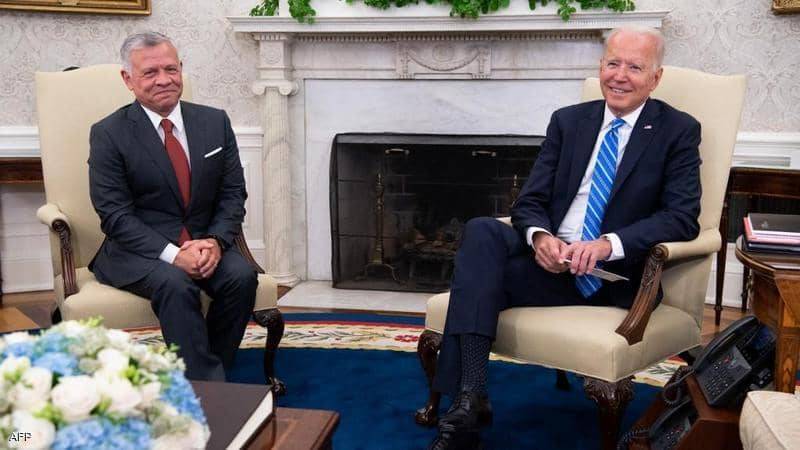U.S. President Joe Biden pledged on Monday, during his meeting at the White House with Jordan's King Abdullah II, to "enhance bilateral cooperation" between the two countries, thanking his guest for his "vital" role in the region. In the first visit by an Arab leader to the White House since Biden took office on January 20, the U.S. president, sitting next to his guest in the Oval Office, stated, "We will continue to enhance our bilateral cooperation."
Biden described the Jordanian monarch as a "dear and loyal friend," addressing him in front of reporters: "Thank you for the vital role you are playing in the Middle East. You live in a tough region." He also thanked King Abdullah II for his "enduring and strategic relationship" with the United States over the years, saying, "You have always been by our side, and you will always find us on Jordan's side."
During the meeting, Biden emphasized that his acquaintance with the Jordanian king dates back decades, recalling that he established a relationship with the kingdom when he was a senator, while the late King Hussein, Abdullah II's father, was in power until 1999.
The handshake between the two leaders in front of the press stood out, becoming a rare occurrence in the White House due to the COVID pandemic. For his part, the Jordanian monarch thanked the U.S. president for the "generosity" of the United States, which donated 500,000 doses of the COVID vaccine to the kingdom.
King Abdullah II also praised the "leading role" of the United States in combating the pandemic, stating: "You have set an example for the world." He spoke about the challenges his country faces in promoting stability in the Middle East, asserting that Jordan and other U.S. allies are prepared to "bear the largest burden" in the region.
The visit included Queen Rania, King Abdullah II's wife, and their son, Crown Prince Hussein, who attended the meeting in the Oval Office. The United States considers Jordan a key ally in the region. In March, the two countries announced an agreement granting U.S. forces freedom of movement on Jordanian territory.
Biden has reverted U.S. policy in the Middle East to its traditional path, particularly supporting a resolution to the Israeli-Palestinian conflict based on a two-state solution, after his predecessor, Donald Trump, sought to bypass this solution, which Amman sees as essential for achieving comprehensive and lasting peace in the Middle East.
The Jordanian king is scheduled to meet on Tuesday in Washington with Secretary of State Antony Blinken and will hold discussions with members of Congress. Biden had expressed his support for Jordan during a phone call with King Abdullah II on April 7, just days after an unprecedented crisis in the kingdom, during which former Crown Prince Hamzah and others in his circle were accused of involvement in a plot to "destabilize Jordan's security and stability."




